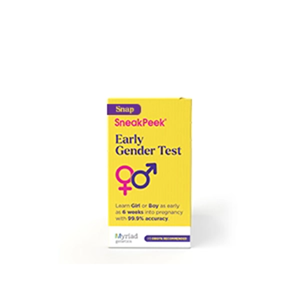Published on July 20th, 2023 and Updated on January 15th, 2024
Check out SneakPeek Gender Test to find out your baby’s gender as early as 6 weeks at over 99% accuracy1!
Newborns, the world’s #1 power-nappers, are notorious for clocking up to 17 hours of sleep on any given day. But for some expectant moms patiently awaiting their arrival? Not so much.
From full-blown insomnia to the difficulty of getting high-quality Zs, some 30% of women concede they “rarely” get a good night’s sleep while pregnant. The root reason why insomnia arises is fairly straightforward: the human sleep pattern is governed by circadian hormonal cycles, and being pregnant can easily throw these for a loop.
Sleep problems can arise at any point during pregnancy, and they can be tremendously frustrating for expectant parents anticipating the challenge of getting adequate sleep after their infant is born. Below, we’ll cover how pregnancy insomnia can manifest and interventions you can make to help you get the rest you deserve.
5 Reasons for Insomnia and Sleep Disturbances During Pregnancy
Whether you have a history of insomnia or bedtime woes are a more recent challenge, it’s very common for pregnant women to deal with a sleep disturbance. Women in their first trimester typically get the best quality sleep of the bunch, though daytime drowsiness remains an issue for roughly 37% of women. Sleep problems are most common during late pregnancy or in the third trimester when it’s not abnormal to deal with between three and five wake-ups during the night.
To begin understanding what causes poor sleep during pregnancy, it’s helpful to note that insomnia can be divided into two categories:
- Initiation insomnia – When you have difficulty falling asleep (delayed sleep onset)
- Maintenance insomnia – When you find yourself waking up in the middle of the night
Of course, it’s entirely possible to experience both. Most poor sleep issues during pregnancy can be attributed to the following 5 changes your body is going through.
#1 Fluctuating Pregnancy Hormones
Hormones are the most important players dictating human sleep cycles, so it’s natural that you might notice some changes when your pregnancy ones kick into high gear. Two hormones in particular lead the charge:
- Estrogen – This hormone dilates the blood vessels (vasodilation) to make room for your body’s elevated blood volume during pregnancy. Enlarged blood vessels can lead to swelling, congestion, and difficulty breathing before and during bedtime.
- Progesterone – Progesterone relaxes smooth muscle fibers, which can heighten both your need to urinate and nasal congestion. Progesterone is also thought to be responsible for reducing your quantity of REM sleep—an important sleep stage underpinning memory, focus, and overall brain health.
Estrogen and progesterone can both play a role in pregnancy sleep issues. But it’s important to note that it’s their fluctuations that underpin sleep disturbances—not necessarily the effects of the hormones themselves.
For this reason, women who dealt with insomnia in their first trimester may notice improved sleep quality in their second (after they’ve adjusted to their new hormonal normal).
#2 Increased Urination
A trademark pregnancy symptom is an increased need to pee, but when the issue plagues you during the wee hours (pun intended), the condition is known as nocturia. As mentioned, you can thank progesterone and its close associate relaxin for dialing up the volume for when nature calls—including in the middle of the night.
#3 Feeling Congested
A lesser-known side effect of pregnancy, nasal congestion or gestational rhinitis is caused by increased blood volume and activity in the mucus membranes of the body.
Congestion on its own can be a nuisance when it comes to achieving satisfactory sleep, but it’s also linked to a maternal sleep disturbance known as sleep disordered breathing (SDB). SDB can manifest with the following symptoms:
- Waking up in the middle of the night
- Waking up with a headache
- Waking up with a dry mouth
- Snoring
- Sleep apnea
- Difficulty falling asleep due to breathing trouble
If you’re having trouble breathing during pregnancy, it’s a good idea to reach out to your physician or OBGYN to consult on a proper course of treatment. SDB is correlated with several maternal and natal health risks, including gestational diabetes and preterm birth, and can be highly responsive to treatments like CPAP.
#4 Your Growing Belly
Those in their later trimesters know all too well that a burgeoning belly circumference can make it harder to find a comfortable sleeping position.
During the day, your little one can also put a strain on your pelvis and lower back. This can result in joint pain and further contribute to difficulty getting cozy at bedtime.
#5 Excessive Stress
The massive physical, emotional, and life changes that attend pregnancy can be a major stressor for many women—and often, that pressure can crop up as many sleepless nights.
Whether you’re experiencing emotional stress, physical symptoms, or both, it’s important to seek out constructive ways to channel, deal with, and dial down anxiety. Fortunately, taking stress to task needn’t be costly or arduous, and tuning up your sleep habits is an excellent place to start.
Promoting Better Sleep During Pregnancy
Sleep issues and insomnia can crop up at any trimester during pregnancy, though if you’re dealing with them in your first trimester, there’s a chance they’ll get more stubborn as you hone in on your due date.
To discourage these from persisting in the postpartum stages, the following approaches can help make sleeping while pregnant (and parenting) a little easier.
Practice Excellent Sleep Hygiene
Like brushing your teeth or washing your face, sleep hygiene refers to the habits we adopt to support our health through quality sleep. Some basic sleep hygiene keystones include:
- Keeping the bedroom cool – Cleveland Clinic recommends keeping your bedroom between 60 and 67ºF (15 and 19ºC) for optimal sleep. This can be especially helpful for women experiencing hormone-related hot flashes or thermoregulatory difficulties in the first trimester, which can make it harder to fall and stay asleep.
- Sleeping on your side – One of the key ways sleep hygiene differs during pregnancy is the necessity of finding a comfortable position to doze off. Lateral postures—sleeping on your side—are recommended for keeping your baby in a safe, roomy environment once you’ve started to show.
- Avoiding caffeine 6 hours before bedtime – Caffeine is known to hinder sleep onset and heighten anxiety levels, though some people may be less responsive to the chemical than others. As a general rule, it’s best to stop drinking caffeinated beverages 4 to 6 hours before dozing off (caffeine-sensitives, or those who are struggling to adapt to hormonal fluctuations, may need to schedule their cutoff earlier).
- Reducing liquid intake before bedtime – To discourage nocturia-related insomnia, try to be mindful of how much fluid you’re drinking before bed. Staying well-hydrated during the day can help you minimize your need for water or tea before it’s time to hit the hay.
- Accounting for bedroom humidity – If you struggle with nasal congestion, adding moisture to your bedroom’s atmosphere may help to mitigate your symptoms. One excellent solution is to purchase a humidifier, which emits water vapor into the air to help you achieve higher humidity (the recommended level is between 30% and 50%).
- Maintaining a low-tech (or no tech) bedroom – Although it’s tempting to scroll yourself to sleep, the heightened stimuli and blue light associated with our devices have been shown to stress out our bodies at bedtime. Try aiming to charge your phone in another room while you sleep. If that’s out of the question, downloading a blue light-reducing filter may help mitigate its impact on sleep.
Aside from these basics, you might also opt for pro-sleep bedding to help you make the most of your sleep. Breathable bedding made of cotton is an excellent choice for helping you stay cool, while investing in a thermoregulatory mattress helps some people improve their sleep quality.
Normalize Your Sleep Schedule
Aiming for the same bedtime and wake-up time is ideal for sleep cycles, pregnant or not. Pregnant women who routinely achieve fewer than 6 hours of nightly rest are more likely to have long labors or cesareans, so it’s best to shoot for about 8 hours per night.
If it’s available to you, you might also try to make some time for naps to help offset any insomnia spells at night.
Create a Wind-Down Routine
Designing a soothing end-of-day routine can be immensely helpful for combatting initiation insomnia. And, through trial and error, it can also introduce you to methods that might help to lull you back to sleep when you wake up at night. You can try:
- Using aromatherapy techniques – Try sprinkling pro-sleep essential oils like lavender or ylang-ylang on your pillow. Or, try placing a calming diffuser on your bedside table.
- Indulging in prenatal massage – There are several benefits of prenatal massage. So, book an appointment with a pro, follow along with some self-massage content on Youtube, or see if your partner would be willing to give your sore muscles some TLC.
- Reading a book – Whether it’s a riveting novel, a parenting book, or a yawn-inducing biography, reading before bed has been shown to bring on the Zs.
- Soaking in the tub – A warm bath with Epsom salts or relaxing scents can do wonders to help your mind and body unwind.
- Listening to a meditation – Putting on a guided meditation during pregnancy can help you get dozey, or even deal with an issue you’re confronting during pregnancy, like anxiety or depression. Alternatively, you might try an ASMR video to help yourself relax.
- Practicing gentle prenatal yoga or stretching – Restorative prenatal yoga or body-kind stretching can help get your body in the sleep zone, even if your mind hasn’t quite caught up yet.
Have a Sound Pregnancy with SneakPeek
As momentous as having a baby on the horizon can be, plenty of aspects of being pregnant are no picnic. But even sleep struggles can have a silver lining: an opportunity to get to know your biology better and become a stronger person and parent in the process.
For an in-depth look at what your future holds, check out SneakPeek’s DNA-based Early Gender DNA Test. This DNA-based at-home gender blood test lets you discover your baby’s gender as early as 6 weeks into your pregnancy with over 99% clinically proven accuracy1. Simply send your sample to the SneakPeek labs, and we’ll triple-review your privacy-protected results and send them back to you the same day we receive your sample.
SneakPeek is OBGYN’s #1 recommended at-home early gender test, trusted by 1 million expecting moms (and counting!). To pick up your test kit and get to know your baby better, check out SneakPeek today.
Sources:
- Johns Hopkins Medicine. Newborn Sleep Patterns. https://www.hopkinsmedicine.org/health/wellness-and-prevention/newborn-sleep-patterns
- National Institutes of Health. What makes us sleep? https://www.nichd.nih.gov/health/topics/sleep/conditioninfo/causes
- National Library of Medicine. Sleep and Women’s Health. https://www.ncbi.nlm.nih.gov/pmc/articles/PMC4327930/
- VeryWell Health. How Sleep Changes During Pregnancy. https://www.verywellhealth.com/sleep-in-pregnancy-3015077
- National Library of Medicine. Sleep disturbances in pregnancy: Why and how should we manage them? https://www.ncbi.nlm.nih.gov/pmc/articles/PMC9564426/
- Sleep Foundation. What is REM Sleep and How Much Do You Need? https://www.sleepfoundation.org/stages-of-sleep/rem-sleep
- Sleep Foundation. Pregnancy and Sleep. https://www.sleepfoundation.org/pregnancy
- Johns Hopkins Medicine. Get a Good Night’s Sleep During Pregnancy. https://www.hopkinsmedicine.org/health/conditions-and-diseases/staying-healthy-during-pregnancy/get-a-good-nights-sleep-during-pregnancy
- Cleveland Clinic. Nocturia. https://my.clevelandclinic.org/health/diseases/14510-nocturia
- Cleveland Clinic. Relaxin. https://my.clevelandclinic.org/health/body/24305-relaxin
- UT Southwestern Medical Center. Baby (and tissues!) on board: Tips for managing pregnancy rhinitis. https://utswmed.org/medblog/pregnancy-stuffy-nose-rhinitis/
- VeryWell Health. Are Hot Flashes an Early Sign of Pregnancy? https://www.ncbi.nlm.nih.gov/pmc/articles/PMC9564426/
- VeryWell Health. How Long Before Bed Should You Stop Drinking Caffeine? https://www.verywellhealth.com/how-long-should-you-wait-between-caffeine-and-bedtime-3014980
- Mayo Clinic. Humidifiers: Ease skin, breathing symptoms. https://www.mayoclinic.org/diseases-conditions/common-cold/in-depth/humidifiers/ART-20048021
- Cleveland Clinic. Why You Should Ditch Your Phone Before Bed. https://health.clevelandclinic.org/put-the-phone-away-3-reasons-why-looking-at-it-before-bed-is-a-bad-habit/

Shop Our Products
SneakPeek aims to provide the most accurate and up-to-date information to help our readers make informed decisions regarding their health before, during, and after pregnancy. This article was written based upon trusted scientific research studies and/or articles. Credible information sources for this article are cited and hyperlinked.





